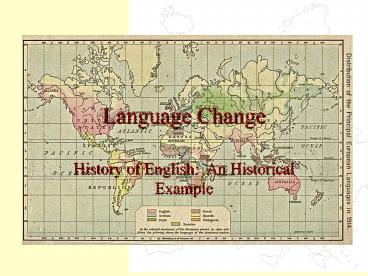Language Change - PowerPoint PPT Presentation
Title:
Language Change
Description:
Language Change History of English: An Historical Example English History Overview 5000 BC Proto-Indo-European (PIE), Indo-European 1000 BC Celts settle ... – PowerPoint PPT presentation
Number of Views:275
Avg rating:3.0/5.0
Title: Language Change
1
Language Change
- History of English An Historical Example
2
English History Overview
- 5000 BC Proto-Indo-European (PIE),
Indo-European - 1000 BC Celts settle British Isles
- 0-400 AD Roman Empire
- 450 1100 Old English
- 499-550 AD Germanic tribes defeat Celts
English ancestors (Angle/Saxon/Jutes) spoke
different dialects of Low German some
borrowings from Latin (defeat of King Arthur, a
Romanized Celt) - ca. 600 AD England converted to Christianity
Latin influence - 750 AD Beowulf, one of earliest extant texts
- ca 850-901 Alfred the Great (Norse influence
they, their, them, are, 3rd singular /-s/, steak,
die, loan.)
3
Beowulf
The image above contains the first line and half
of Beowulf from the first leaf of the manuscript
HWÆT WE GARDEna in gear dagum þeod cyninga
What! We Spear-Danes in yore-days tribe-kings
Because there were sounds in Old English
(600-1100 AD) that were not thought to be
represented by the Roman alphabet, Old English
used runic characters for those sounds. The runes
were "asc" (pronounced "ash") (æ), "eth" (ð),
"thorn" (þ), and "wen" (looks similar to a "p"
but with a smaller curved bow).
4
English History (cont)
- 1066 AD Norman Conquest French influence
- 1200 AD Normandy and England are separated
- 13th-14th c. Growing sense of Englishness
- 1340-1450 Chaucer
- 1450-1700 Early Modern English
- 1476 First English book printed
- 1564-1616 Shakespeare (Greek and Latin
borrowings) - 16th-19th c. Imperialism (Swahili, Hindi,
Tamil, Chinese, etc. via the colonies) - 1700-Present Modern English
5
Linguistic Chronology of English
Prehistory Dates Important events Literature/lang.
Proto-European to Germanic Pre-500 AD Celts Romans Germanic (Anglo/Saxon/Jutes) Anglo/Saxon Grimms Law First Germanic Consonant Shift
OLD ENGLISH 600 1100 AD Conversion of Anglo-Saxons to Christianity Latin alphabet Norman Conquest (1066) Beowulf Loss of /x/, gain /??/, allophones become phones, lose of case endings, more rigid word order
MIDDLE ENGLISH 1100 1500 AD Printing introduced to English by William Caxton (1475) Chaucer Initial consonant clusters simplified Great Vowel Shift in stressed syllables Final vowel deletion ? in unstressed syllables Shakespeare (1564 1616) King James Bible (1611) 1st English Dictionary (1603)
MODERN Early and Late 1700 ? present English Renaissance English Grammar (based on Latin model) Samuel Johnsons Dictionary (1755) Websters (American) (1828) Oxford English Dictionary (12-volume)
6
Sound familiar?
- house, mouse, louse, out
- Old English
- u hus, mus, lus, ut
- Modern English
- aw haws, maws, laws, awt
- Virginia dialect (US) sounds like more like Old
English than Modern English
7
The Regularity of Sound Change
- Gradual
- Every instance of the sound in question will
eventually undergo the change, not in just one or
two words only. - Eventually affecting all speakers of the language
8
Grimms Law(or the First Germanic Consonant
Shift)
1785-1863
- Aspirated voiced stops in Proto-IE became
unaspirated in Proto-Germanic - bh, dh, gh become b, d, g
- Unaspirated voiced stops in Proto-IE became
voiceless in Proto-Germanic - b, d, g become p, t, k
- Voiceless stops in Proto-IE became voiceless
fricatives in Proto-Germanic. - p, t, k become f, þ, h
- Demonstration
Web Link
9
(No Transcript)
10
Grimms Law at Work
11
Practice
- Explain how the following sets of words do or do
not illustrate Grimms Law (note do not consider
only initial consonants).
Sanskrit pitar bhinádmi bhrátar
Greek pater pheídomai phráter
Latin pater findo frater
English father bite brother
12
More Changes
- Old English to Middle English
- Loss of /x/ and /?/(voiceless velar fricative)
- Spelled ht (brought, night)
- Sounded like German ich
- Allophonic variants became phonemes
- wife and wives v was allophone of f
- f/v safe sef and save sev
- Also s/z, ?/?, ?/?
- Loss of inflectional endings, resulting in more
rigid word order. - Residuals /-s/, /-th/, /-ende/ (later became
/-ing/)
13
More Changes
- Middle English
- Simplification of some initial consonant
sequences - kn became n (knee)
- hl became l (hlaf to loaf)
- hr became r (hring to ring)
- wr became r (wrong)
- Vowel deletion in unstressed final syllables
- name ne??, laughed ?????
- became ???, ????
14
Great Vowel Shift
- Middle English to Early Modern English
- Affected seven long vowels and diphthongs in
stressed syllables. - From Saw it is team to say the shows on the
sarm fate noo. - To So it is time to see the shoes on the same
feet now. - However, spelling often did not change!
- ??? team
- name ??? became ???
15
Great Vowel Shift (contd)
16
The Way We Were.
- The Lords Prayer in Old English Form
Fæder ure þu þe eart on heofonum, Si þin nama
gehalgod. to becume þin rice, gewurþe ðin willa,
on eorðan swa swa on heofonum. urne
gedæghwamlican hlaf syle us todæg, and forgyf us
ure gyltas, swa swa we forgyfað urum gyltendum.
and ne gelæd þu us on costnunge, ac alys us of
yfele. soþlice.
Old English version of the Lord's Prayer (Matthew
69-13), as given in the West Saxon Gospels
17
The Way We Are
- English Today































